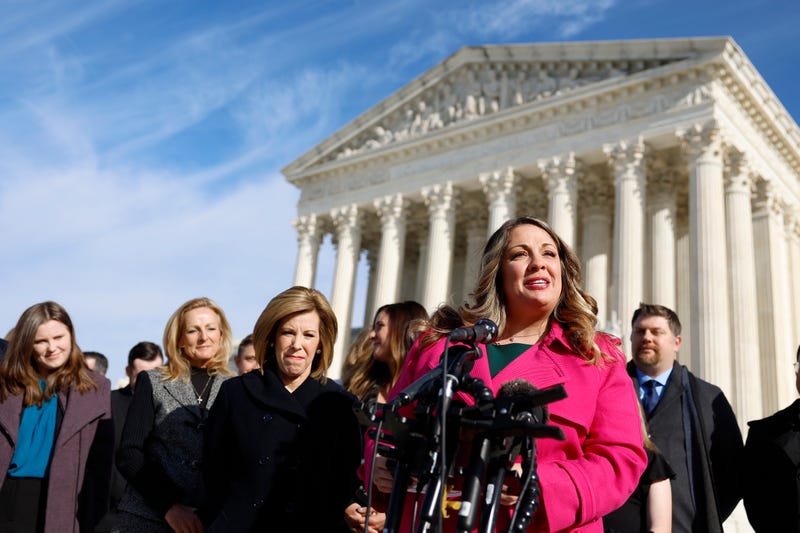
WASHINGTON (AP) — In a defeat for gay rights, the Supreme Court's conservative majority ruled on Friday that a Christian graphic artist who wants to design wedding websites can refuse to work with same-sex couples.
One of the court's liberal justices wrote in a dissent that the decision's effect is to "mark gays and lesbians for second-class status" and that the decision opens the door to other discrimination.
The court ruled 6-3 for designer Lorie Smith, saying that she can refuse to design websites for same-sex weddings despite a Colorado law that bars discrimination based on sexual orientation, race, gender and other characteristics. The court said forcing her to create the websites would violate her free speech rights under the Constitution's First Amendment.
The decision suggests that artists, photographers, videographers and writers are among those who can refuse to offer what the court called expressive services if doing so would run contrary to their beliefs. But that's different from other businesses not engaged in speech and therefore not covered by the First Amendment, such as restaurants and hotels.
Justice Neil Gorsuch wrote for the court's six conservative justices that the First Amendment "envisions the United States as a rich and complex place where all persons are free to think and speak as they wish, not as the government demands." Gorsuch said that the court has long held that "the opportunity to think for ourselves and to express those thoughts freely is among our most cherished liberties and part of what keeps our Republic strong."
Some Philadelphia leaders say the decision is a green light for discrimination against the LGBTQ community, as well as other groups.
“I think this is another example of the Supreme Court doing what I think a lot of people feared that it would do, which is dismantling basic rights for Americans across the country,” said Sultan Shakir, head of the Mazzoni Center, an organization that provides health and wellness services to the LGBTQ community. “And I think that's something that we have decided as a country is not okay. And we're going backwards.”
“I'm a black queer person who grew up Muslim in Philadelphia and so, like, hearing that the Supreme Court is opening the door to public businesses being allowed to discriminate is scary,” Shakir added. “I mean, it could affect women, it could affect people of color, it could affect immigrants, it could affect anyone that a group of people here in the U.S. wants to discriminate against.
The decision is a win for religious rights and one in a series of cases in recent years in which the justices have sided with religious plaintiffs. It's also a retreat on gay rights for the court.
For nearly three decades, the court has expanded the rights of LGBTQ people, most notably giving same-sex couples the right to marry in 2015 and announcing five years later in a decision written by Gorsuch that a landmark civil rights law also protects gay, lesbian and transgender people from employment discrimination.
In the latest decision, however, Gorsuch said that a ruling against Smith would allow the government "to force all manner of artists, speechwriters, and others whose services involve speech to speak what they do not believe on pain of penalty."
For example, a gay website designer could be forced to design websites for an organization that advocates against same-sex marriage, he wrote. "Countless other creative professionals, too, could be forced to choose between remaining silent, producing speech that violates their beliefs, or speaking their minds and incurring sanctions for doing so."
The court's dissenting liberal justices led by Justice Sonia Sotomayor warned that the decision will allow a range of businesses to discriminate.
"Today, the Court, for the first time in its history, grants a business open to the public a constitutional right to refuse to serve members of a protected class," Sotomayor wrote in a dissent joined by Justice Elena Kagan and Justice Ketanji Brown Jackson.
Sotomayor, who read a summary of her dissent in court to underscore her disagreement, said that the decision's logic "cannot be limited to discrimination on the basis of sexual orientation or gender identity." A website designer could refuse to create a wedding website for an interracial couple, a stationer could refuse to sell a birth announcement for a disabled couple, and a large retail store could limit its portrait services to "traditional" families, she wrote.
Sotomayor referenced the court's history with the issue of gay rights in her dissent, writing: "The LGBT rights movement has made historic strides, and I am proud of the role this Court has recently played in that history. Today, however, we are taking steps backward."
"Today is a sad day in American constitutional law and in the lives of LGBT people. ... the immediate, symbolic effect of the decision is to mark gays and lesbians for second-class status," she wrote at another point.
Smith, who owns a Colorado design business called 303 Creative, does not currently create wedding websites. She has said that she wants to but that her Christian faith would prevent her from creating websites celebrating same-sex marriages. And that's where she ran into conflict with state law.
Colorado, like most other states, has a law forbidding businesses open to the public from discriminating against customers. And about half of the states have laws explicitly prohibiting discrimination based on sexual orientation and gender identity. Colorado said that under its so-called public accommodations law, if Smith offers wedding websites to the public, she must provide them to all customers, regardless of sexual orientation.
Businesses that violate the law can be fined, among other things. Smith argued that applying the law to her violates her First Amendment rights, and the Supreme Court agreed.
Foundation for Individual Rights and Expressions, a Philly-based organization, feels the court’s decision “reaffirms decades of precedent protecting our First Amendment rights to speak and think free of government compulsion.”




